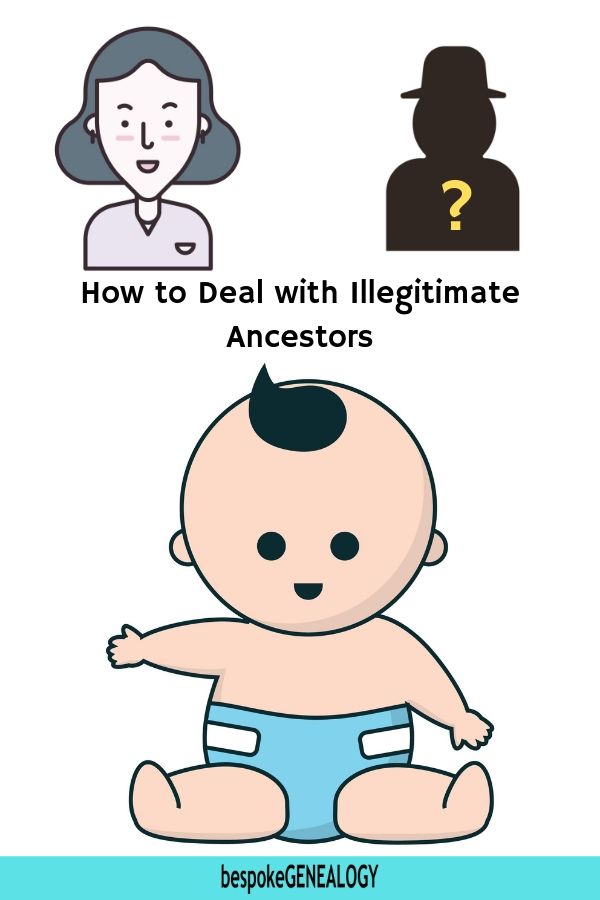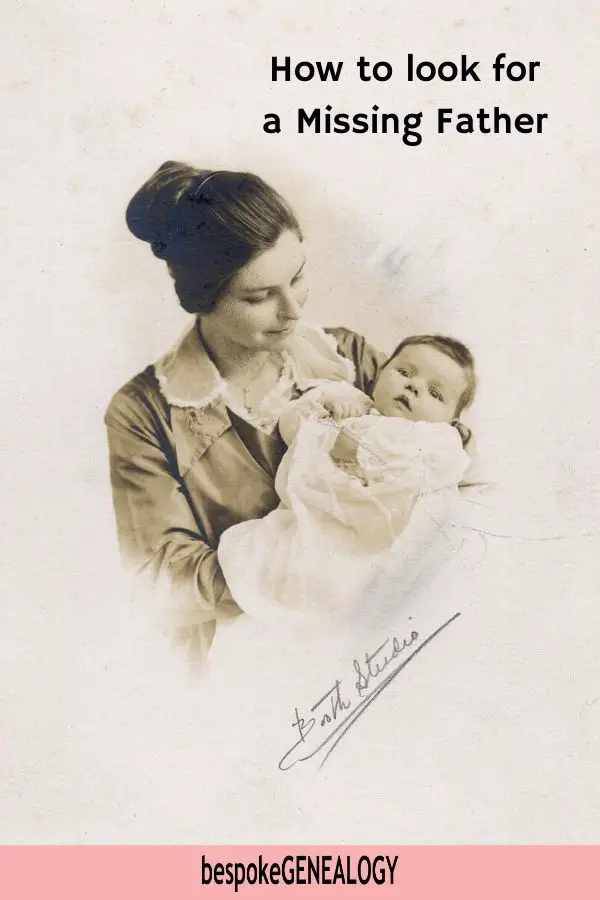One of the most common causes of genealogy brick walls is “illegitimacy”. Our research comes to a grinding halt when we discover that the father of a child is “unknown”. This post looks at some of the ways you can investigate these so called “illegitimate” ancestors to try and figure out who the fathers were.

“Illegitimacy” was not that uncommon in industrialized countries in the 19th century. According to recent research; 6.5 per cent of births in England and Wales were “illegitimate”, with a higher number (9 per cent) in Scotland. There is therefore a good chance that you have at least one “illegitimate” birth in your family tree. Note: this post focuses on records from the British Isles, but similar records should exist in other countries.
There will probably only be a small chance that you will identify the father of an “illegitimate” child with 100 per cent certainty, but you may find some clues that can point you in the right direction.
Note: The terms “illegitimate” and “illegitimacy” are unfortunate and would not be used today. The terms are used in this article as they appeared on official documents until relatively recently, so this is what you will see in your research. FYI: Genetic genealogists today use the term “non-paternity event”.
Talk to family members
If the “illegitimate” child was a grand parent or great grand parent, then there may be someone in your family who knows something. As well as your immediate family, it’s always worth talking to cousins, uncles and aunts as well. Of course, this will be a sensitive subject, so some tact and diplomacy may be needed.
Look at the name
There may be a big clue in a child’s name. Very often a child’s middle name will be the surname of the father. If he child was a boy, he may even have the father’s first name as well.
Find the Baptism record
If you only have the child’s civil birth record, look for the baptism record. The minister may have known who the father was and recorded it. Also, baptisms sometimes happen several months or even years after a birth and circumstances may have changed, for example the parents may have married.
Look for other Church records
There may be other church records where a minister has recorded the name of a suspected father. For example the Kirk Session Minutes in Scotland often record this information in great detail. Incidentally, these Scottish records are being digitized and will eventually be available online. Keep an eye on the National Records of Scotland website for updates.
For other areas, check the church and the local archives to see what records are available.
Look for an RCE entry on Scottish Birth records
If the “illegitimate” child was born in Scotland from 1855, check for an RCE (Register of Corrected Entries) reference. If there is an entry in the register, there will be a note in the margin of the civil birth record which references the RCE. Birth records and RCE entries can be downloaded from Scotland’s People (pay per view).
There may be an RCE entry if the parents married after the birth or if the mother wins a paternity case in the courts.
The Courts
The unmarried mother may have gone to court to have a child’s legal paternity determined and to get maintenance payments. For England and Wales, disputes over maintenance payments for the child would be held in the petty sessions. These records will likely be kept in the county archives. To locate the archives for the county you’re interested in, see the English and Welsh Parish Register guides on this website to find links.
See also this useful guide to courts of law at the National Archives.
Irish Petty Sessions Registers can be found on Findmypast.
For other countries, I recommend contacting the local archive. If minor court records are not held there, they should be able to tell you where you can find them.
Poor Law Records
If the child was born before 1834 (in England and Wales), it is also worth checking the local archives for Poor Law records. The local parish had a legal obligation to be responsible for the upkeep of an “illegitimate” child. They may have pursued the father for maintenance payments and if they did, you should find records.
Find out as much as you can about the mother and child
If you don’t make any progress with the suggestions above, then I suggest looking in detail at the lives of the mother and child. Focus especially on where was the mother was living and working 9 months before the birth. Look at census records and electoral registers if available.
How was the mother living after the birth? If the father was wealthy, or perhaps married to someone else, there may be signs of money. Did the mother have a better standard of living then her siblings? And the child, where was he/she educated and where did he/she work? Is there anything unusual here?
If you suspect someone, see if you can find a will. The father may not have left money directly to the child, but he may have set up a Trust Fund for him, or left money to his mother.
Piecing together the lives of mother and child may yield useful clues.
DNA testing
If all else fails, DNA testing is becoming an increasingly useful tool for determining the paternity of “illegitimate” ancestors. By contacting “matches” and comparing family trees, it is sometimes possible to figure out who a father was. I know a couple of people who have managed to do that.
See Which Genealogy DNA Test? for an overview of the main companies offering tests.
Once you have your results, it’s a good idea to also put them on GEDmatch to increase your chances of a match.
Good luck and happy researching!
Please pin a pin to Pinterest:









Amongst 12 entries of children born to a couple in early 18th.c Isle of Man, there is one giving a different mother but having the same fathers name
as in the other 11 entries. There is no record of this woman marrying a man with this fathers name. Could this be an illegitimate birth where her
name and that of the married father are recorded in the Parish register.
Thanks for your question Brian. Usually illegitimate births were marked as such in parish registers, even if the father was known. There could be a number of reasons for what you’ve found:
It’s a different couple. As well as locals, many families from the mainland would come over to the Island to work in the mines and then later return.
The minister made a mistake with a name.
The man remarried and the marriage entry is either lost or happened elsewhere. Marriages often took place in the woman’s home parish.
If the birth is in the middle of the other entries, it’s probably a different couple.
Alistair
I have a ancestry that was supposed to of been a orphan. There’s nothing known about him just his name and where he lived.
If your ancestor was an orphan, he may have spent his early years in an orphanage. If you can locate the orphanages near where he lived, you may find records that tell you why he was admitted and even who his parents were.
Good luck!
Birth recorded three times in Norfolk according to BDM. This was in 1891. Were people paid to register births to cover up illegitimacy as registered mother had a different name to known mother. Father unknown. Known mother listed in census just prior to birth.
Thanks for your comment Wendy. I would be surprised if a birth was registered more than once with the GRO. Are you looking at the actual GRO index? Have you checked the GRO website: https://www.gro.gov.uk/gro/content/certificates/Login.asp ? You need to set up an account but it’s free to look at the index which also shows the mother’s maiden name. Also, have you checked the parish record?
I’ve never come across any evidence of someone being paid to register the birth of a child who wasn’t their own. However, sometimes, you do see what you suspect is a grandmother registering the birth of her daughter’s child as her own.
Good luck!
Alistair
Thank you for your comments Alistair.
I am still awaiting a new password for GRO. However, the records available on freebmd.org.uk lists three entries. First, birth recorded as a girl, the second, change of first name but similar to first name with F beside it. The third the same as the second name with F T in brackets after the name.
Believe that Sussex House in London UK mentioned that illegitimate births were often covered up with male births being recorded as female. The fact that the record of the birth was misspelt brought about the query of the payment for people to register births?
Cheers
Wendy
I can’t find anything on My great grandfather , he himself on marriage documents show unknown parents. He only knew his father and mother was born in Ireland. His name is very common there. Any ideas you can share to find his parents?
Hi Laura, you need to obtain your great grandfather’s birth record or adoption record. If this also shows both parents unknown, then your only option is probably a DNA test with Ancestry or similar.
If just the mother is named, then you can use the suggestions in the article.
If both parents names are listed on the birth record, then I would suggest first researching your own country thoroughly. Look especially for census returns, vital records and newspaper announcements, especially obituaries for direct as well as indirect relatives. Anything that may yield a clue to where the parents came from.
Good luck
Hello,
Trying to find my parental surname great grandfather X 5. Looks like his mother gave birth in 1794 in South Leverton. I have tried searching all the Elizabeth Fletchers in the area but she is the only one coming back within a local distance (4 miles away in East Retford). Thing is, if this is her, then she was 14!! I am hoping I have it wrong and that her son was from further away and I am just looking at wrong record. Is there a way to find out who the father was from 200 years ago? Thanks
Hi Ben,
A number of things to consider here. Firstly, I don’t believe that all Nottinghamshire parish registers are actually online. For William’s baptism in 1794 in South Leverton, I could only see a transcript of the Bishop’s Transcript. These were contemporary copies of the registers, but many are missing. The Notts Family History Society have transcribed most of the registers and they are available on disc at a reasonable price: https://nottsfhs.org/shop/
Some general points; single women often gave birth far away from their home parish to avoid a local scandal. It could be that she was staying with a relative or family friend. Also, baptisms usually happened days or weeks after a birth. But sometimes they happened several years after a birth. I came across one family who baptized all 6 of their children at the same time, aged between 1 and 10! And sometimes a child may have been baptized with one name and used a different one (maybe a middle name) all their lives.
As for finding a father 200 years ago. The first thing to do is to check the original register as the Vicar may have made notes in the margin about a possible father. As only transcripts seem to be online, then you need to access the original at the Nottinghamshire Archives: https://www.inspireculture.org.uk/heritage/archives/enquiries/ . Staff there will be able to do a lookup for you for a fee. Details are on the website. Failing that, there may be Petty Sessions records if Elizabeth tried to get money from the father through the court. These records will also be at the archives.
Good luck!